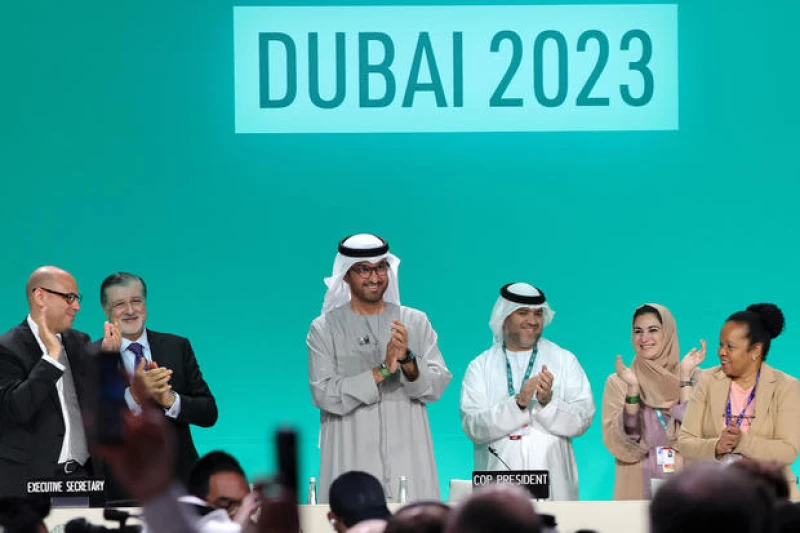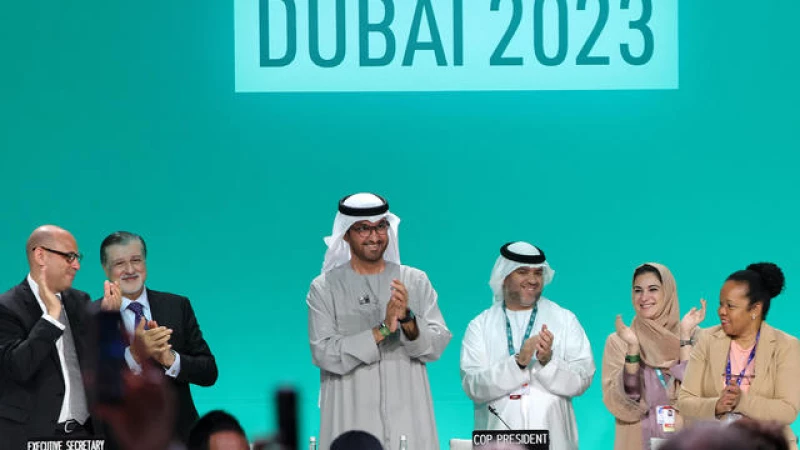United Nations Climate Negotiators Call for Transition Away from Fossil Fuels
Dubai, United Arab Emirates — United Nations climate negotiators directed the world on Wednesday to transition away from planet-warming fossil fuels in a move the talks' chief called "historic," despite critics' worries about loopholes.
Within minutes of opening Wednesday's session, COP28 President Sultan al-Jaber gaveled approval of the central document, which says how far the world is off-track its climate-fighting goals and how it is going to get back - without asking for comments. Delegates stood and hugged each other.

"It is a plan that is led by the science,'' al-Jaber said. "It is an enhanced, balanced but make no mistake, a historic package to accelerate climate action. It is the UAE consensus."
"We have language on fossil fuel in our final agreement for the first time ever," said al-Jaber, CEO of the UAE's oil company.
The new deal had been floated early Wednesday after a global rallying cry and was stronger than one proposed days earlier, but still had loopholes that upset critics.
It was seen as a significant step toward shifting how the world is powered but one filled with questions about how soon and who will pay for the transition.
The international community has reached a landmark climate agreement that aims to transition away from fossil fuels in a just and equitable manner. While it falls short of the "phase-out" of fossil fuels that many nations had called for, the agreement emphasizes the need to accelerate action in this critical decade.
The main objective of the agreement is to achieve net zero greenhouse gas emissions by 2050, in line with the recommendations of climate science. It also sets a target for countries to peak their carbon pollution by 2025, with some flexibility for individual nations like China to peak later.
"The world is burning, we need to act now," emphasized Ireland Environment Minister Eamon Ryan.
According to Reuters, U.S. Special Presidential Envoy for Climate John Kerry stated that the agreement sends a powerful message to the world. Both the United States and China have committed to updating their long-term climate strategies to align with the terms of the agreement.
Intense Sessions at Climate Conference
Sessions with delegates from various countries continued until the early hours of Wednesday morning after the conference presidency's initial document received backlash for not taking decisive action on curbing global warming. The United Arab Emirates-led presidency then presented a new central document, called the global stocktake, to delegates from nearly 200 nations at sunrise.
This latest version of the document is the third one presented in the past two weeks. Interestingly, the word "oil" does not appear in the 21-page document, although "fossil fuels" is mentioned twice.
The Alliance of Small Island States expressed concern about the text, stating that it is "incremental and not transformational" and contains several loopholes. Jean Su, the energy justice director at the Center for Biological Diversity, also criticized the document, saying that while it is a step in the right direction, it still has significant flaws.
According to Su, the text allows countries like the United States to continue expanding their use of fossil fuels. Su also highlighted the inclusion of "transitional fuels," which is a code word for natural gas that emits carbon pollution.






